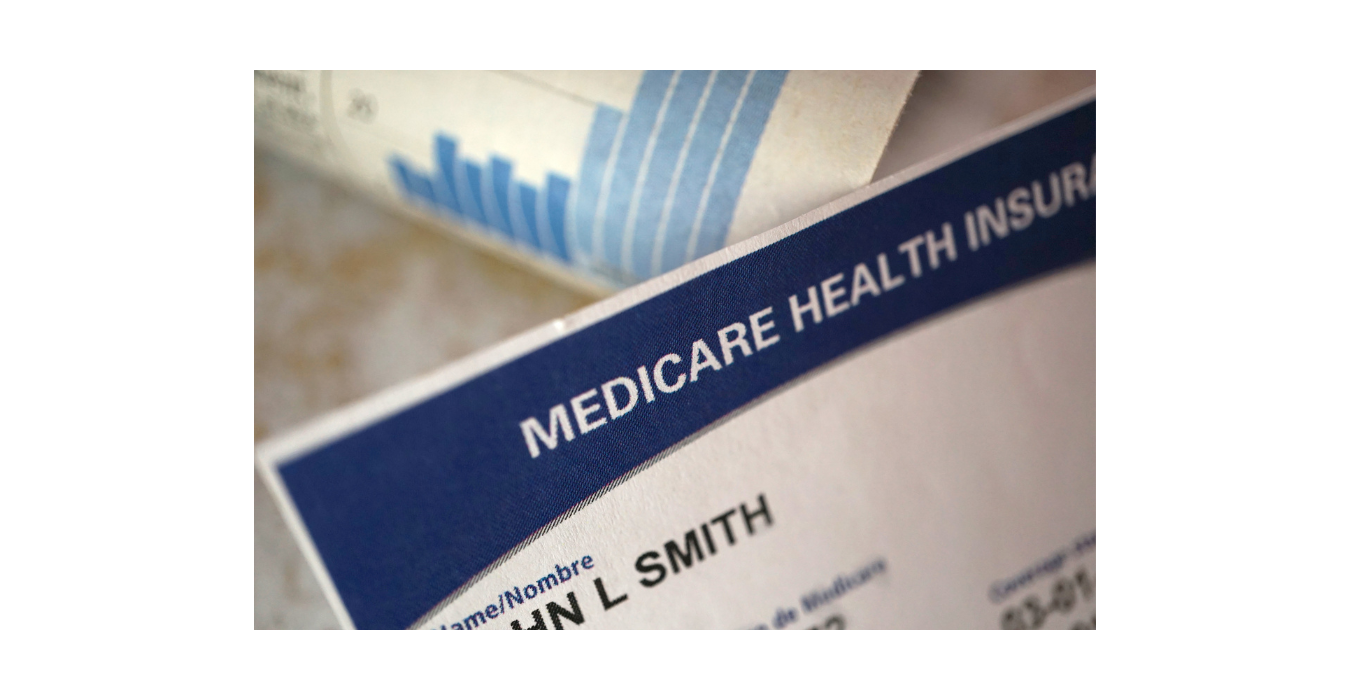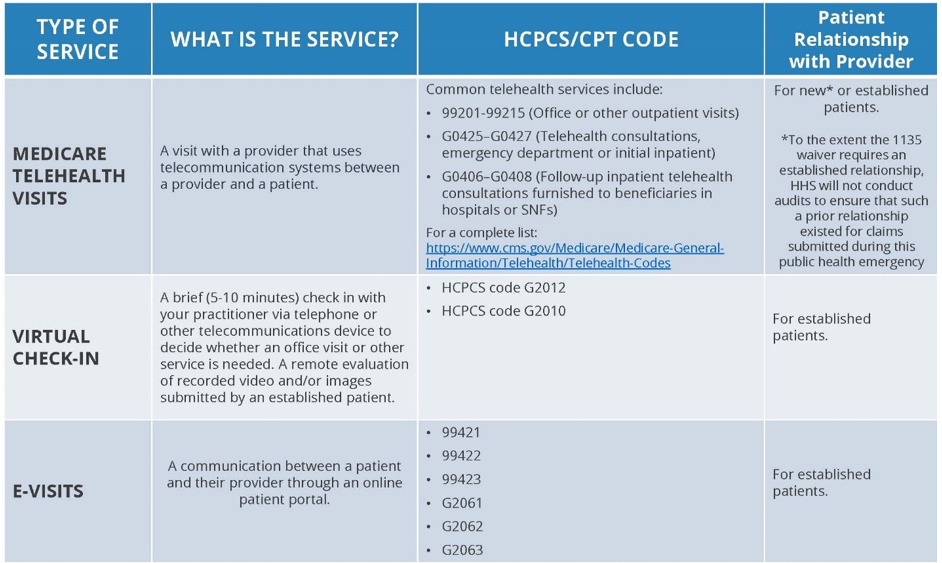CMS Medicare-Telemedicine Healthcare Provider Fact Sheet

https://www.cms.gov/newsroom/fact-sheets/medicare-telemedicine-health-care-provider-fact-sheet
MEDICARE TELEMEDICINE HEALTH CARE PROVIDER FACT SHEET
Mar 17, 2020
Medicare coverage and payment of virtual services
INTRODUCTION:
Under President Trump’s leadership, the Centers for Medicare & Medicaid Services (CMS) has broadened access to Medicare telehealth services so that beneficiaries can receive a wider range of services from their doctors without having to travel to a healthcare facility. These policy changes build on the regulatory flexibilities granted under the President’s emergency declaration. CMS is expanding this benefit on a temporary and emergency basis under the 1135 waiver authority and Coronavirus Preparedness and Response Supplemental Appropriations Act. The benefits are part of the broader effort by CMS and the White House Task Force to ensure that all Americans – particularly those at high-risk of complications from the virus that causes the disease COVID-19 – are aware of easy-to-use, accessible benefits that can help keep them healthy while helping to contain the community spread of this virus.
Telehealth, telemedicine, and related terms generally refer to the exchange of medical information from one site to another through electronic communication to improve a patient’s health. Innovative uses of this kind of technology in the provision of healthcare is increasing. And with the emergence of the virus causing the disease COVID-19, there is an urgency to expand the use of technology to help people who need routine care, and keep vulnerable beneficiaries and beneficiaries with mild symptoms in their homes while maintaining access to the care they need. Limiting community spread of the virus, as well as limiting the exposure to other patients and staff members will slow viral spread.
EXPANSION OF TELEHEALTH WITH 1135 WAIVER: Under this new waiver, Medicare can pay for office, hospital, and other visits furnished via telehealth across the country and including in patient’s places of residence starting March 6, 2020. A range of providers, such as doctors, nurse practitioners, clinical psychologists, and licensed clinical social workers, will be able to offer telehealth to their patients. Additionally, the HHS Office of Inspector General (OIG) is providing flexibility for healthcare providers to reduce or waive cost-sharing for telehealth visits paid by federal healthcare programs.
Prior to this waiver Medicare could only pay for telehealth on a limited basis: when the person receiving the service is in a designated rural area and when they leave their home and go to a clinic, hospital, or certain other types of medical facilities for the service.
Even before the availability of this waiver authority, CMS made several related changes to improve access to virtual care. In 2019, Medicare started making payment for brief communications or Virtual Check-Ins, which are short patient-initiated communications with a healthcare practitioner. Medicare Part B separately pays clinicians for E-visits, which are non-face-to-face patient-initiated communications through an online patient portal.
Medicare beneficiaries will be able to receive a specific set of services through telehealth including evaluation and management visits (common office visits), mental health counseling and preventive health screenings. This will help ensure Medicare beneficiaries, who are at a higher risk for COVID-19, are able to visit with their doctor from their home, without having to go to a doctor’s office or hospital which puts themselves and others at risk.
TYPES OF VIRTUAL SERVICES:
There are three main types of virtual services physicians and other professionals can provide to Medicare beneficiaries summarized in this fact sheet: Medicare telehealth visits, virtual check-ins and e-visits.
MEDICARE TELEHEALTH VISITS: Currently, Medicare patients may use telecommunication technology for office, hospital visits and other services that generally occur in-person.
- The provider must use an interactive audio and video telecommunications system that permits real-time communication between the distant site and the patient at home. Distant site practitioners who can furnish and get payment for covered telehealth services (subject to state law) can include physicians, nurse practitioners, physician assistants, nurse midwives, certified nurse anesthetists, clinical psychologists, clinical social workers, registered dietitians, and nutrition professionals.
- It is imperative during this public health emergency that patients avoid travel, when possible, to physicians’ offices, clinics, hospitals, or other health care facilities where they could risk their own or others’ exposure to further illness. Accordingly, the Department of Health and Human Services (HHS) is announcing a policy of enforcement discretion for Medicare telehealth services furnished pursuant to the waiver under section 1135(b)(8) of the Act. To the extent the waiver (section 1135(g)(3)) requires that the patient have a prior established relationship with a particular practitioner, HHS will not conduct audits to ensure that such a prior relationship existed for claims submitted during this public health emergency.
KEY TAKEAWAYS:
- Effective for services starting March 6, 2020 and for the duration of the COVID-19 Public Health Emergency, Medicare will make payment for Medicare telehealth services furnished to patients in broader circumstances.
- These visits are considered the same as in-person visits and are paid at the same rate as regular, in-person visits.
- Starting March 6, 2020 and for the duration of the COVID-19 Public Health Emergency, Medicare will make payment for professional services furnished to beneficiaries in all areas of the country in all settings.
- While they must generally travel to or be located in certain types of originating sites such as a physician’s office, skilled nursing facility or hospital for the visit, effective for services starting March 6, 2020 and for the duration of the COVID-19 Public Health Emergency, Medicare will make payment for Medicare telehealth services furnished to beneficiaries in any healthcare facility and in their home.
- The Medicare coinsurance and deductible would generally apply to these services. However, the HHS Office of Inspector General (OIG) is providing flexibility for healthcare providers to reduce or waive cost-sharing for telehealth visits paid by federal healthcare programs.
- To the extent the 1135 waiver requires an established relationship, HHS will not conduct audits to ensure that such a prior relationship existed for claims submitted during this public health emergency.
VIRTUAL CHECK-INS: In all areas (not just rural), established Medicare patients in their home may have a brief communication service with practitioners via a number of communication technology modalities including synchronous discussion over a telephone or exchange of information through video or image. We expect that these virtual services will be initiated by the patient; however, practitioners may need to educate beneficiaries on the availability of the service prior to patient initiation.
Medicare pays for these “virtual check-ins” (or Brief communication technology-based service) for patients to communicate with their doctors and avoid unnecessary trips to the doctor’s office. These virtual check-ins are for patients with an established (or existing) relationship with a physician or certain practitioners where the communication is not related to a medical visit within the previous 7 days and does not lead to a medical visit within the next 24 hours (or soonest appointment available). The patient must verbally consent to receive virtual check-in services. The Medicare coinsurance and deductible would generally apply to these services.
Doctors and certain practitioners may bill for these virtual check in services furnished through several communication technology modalities, such as telephone (HCPCS code G2012). The practitioner may respond to the patient’s concern by telephone, audio/video, secure text messaging, email, or use of a patient portal. Standard Part B cost sharing applies to both. In addition, separate from these virtual check-in services, captured video or images can be sent to a physician (HCPCS code G2010).
KEY TAKEAWAYS:
- Virtual check-in services can only be reported when the billing practice has an established relationship with the patient.
- This is not limited to only rural settings or certain locations.
- Individual services need to be agreed to by the patient; however, practitioners may educate beneficiaries on the availability of the service prior to patient agreement.
- HCPCS code G2012: Brief communication technology-based service, e.g. virtual check-in, by a physician or other qualified health care professional who can report evaluation and management services, provided to an established patient, not originating from a related e/m service provided within the previous 7 days nor leading to an e/m service or procedure within the next 24 hours or soonest available appointment; 5-10 minutes of medical discussion.
- HCPCS code G2010: Remote evaluation of recorded video and/or images submitted by an established patient (e.g., store and forward), including interpretation with follow-up with the patient within 24 business hours, not originating from a related e/m service provided within the previous 7 days nor leading to an e/m service or procedure within the next 24 hours or soonest available appointment.
- Virtual check-ins can be conducted with a broader range of communication methods, unlike Medicare telehealth visits, which require audio and visual capabilities for real-time communication.
E-VISITS: In all types of locations including the patient’s home, and in all areas (not just rural), established Medicare patients may have non-face-to-face patient-initiated communications with their doctors without going to the doctor’s office by using online patient portals. These services can only be reported when the billing practice has an established relationship with the patient. For these E-Visits, the patient must generate the initial inquiry and communications can occur over a 7-day period. The services may be billed using CPT codes 99421-99423 and HCPCS codes G2061-G2063, as applicable. The patient must verbally consent to receive virtual check-in services. The Medicare coinsurance and deductible would apply to these services.
Medicare Part B also pays for E-visits or patient-initiated online evaluation and management conducted via a patient portal. Practitioners who may independently bill Medicare for evaluation and management visits (for instance, physicians and nurse practitioners) can bill the following codes:
- 99421: Online digital evaluation and management service, for an established patient, for up to 7 days, cumulative time during the 7 days; 5–10 minutes
- 99422: Online digital evaluation and management service, for an established patient, for up to 7 days cumulative time during the 7 days; 11– 20 minutes
- 99423: Online digital evaluation and management service, for an established patient, for up to 7 days, cumulative time during the 7 days; 21 or more minutes.
Clinicians who may not independently bill for evaluation and management visits (for example – physical therapists, occupational therapists, speech language pathologists, clinical psychologists) can also provide these e-visits and bill the following codes:
- G2061: Qualified non-physician healthcare professional online assessment and management, for an established patient, for up to seven days, cumulative time during the 7 days; 5–10 minutes
- G2062: Qualified non-physician healthcare professional online assessment and management service, for an established patient, for up to seven days, cumulative time during the 7 days; 11–20 minutes
- G2063: Qualified non-physician qualified healthcare professional assessment and management service, for an established patient, for up to seven days, cumulative time during the 7 days; 21 or more minutes.
KEY TAKEAWAYS:
- These services can only be reported when the billing practice has an established relationship with the patient.
- This is not limited to only rural settings. There are no geographic or location restrictions for these visits.
- Patients communicate with their doctors without going to the doctor’s office by using online patient portals.
- Individual services need to be initiated by the patient; however, practitioners may educate beneficiaries on the availability of the service prior to patient initiation.
- The services may be billed using CPT codes 99421-99423 and HCPCS codes G2061-G206, as applicable.
- The Medicare coinsurance and deductible would generally apply to these services.
HEALTH INSURANCE PORTABILITY AND ACCOUNTABILITY ACT (HIPAA): Effective immediately, the HHS Office for Civil Rights (OCR) will exercise enforcement discretion and waive penalties for HIPAA violations against health care providers that serve patients in good faith through everyday communications technologies, such as FaceTime or Skype, during the COVID-19 nationwide public health emergency. For more information: https://www.hhs.gov/hipaa/for-professionals/special-topics/emergency-preparedness/index.html
Summary of Medicare Telemedicine Services


